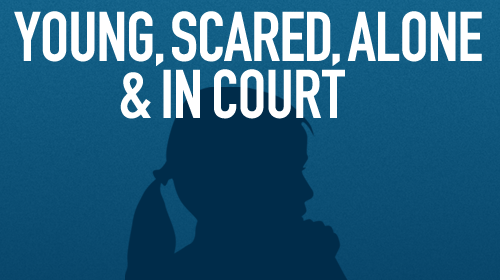
At first glance, the kids I met at the Ft. Sill military base in Lawton, Oklahoma, seemed like ordinary teenagers. They wore friendship bracelets they'd made in arts and crafts. Boys had baseball caps and girls had brightly colored nail polish with tiny flowers painted on them. But, one by one, they started to share their stories, and it became clear that their lives are anything but ordinary.
One girl said she never attended high school because it was far away and would have required her to take a bus through an area patrolled by gangs that rob, harass, and intimidate anyone who passes through. Another boy told me that he enrolled in a high school 45 minutes away, but after he was robbed for the second time by a gang that kept showing up on school property, his mother arranged for him to leave. Each of the kids I spoke with said these gangs are made up of grown men in their thirties and that they act with complete impunity.
One teenager, Reyna*, said she was waiting to be reunited with her big sister in Washington, D.C. Poised and confident, Reyna wants to study engineering. But she broke down in tears as soon as we asked her about home. With only 20 or 30 minutes to meet with each kid, we were barely scratching the surface of their experiences; trauma is unlikely to be shared in such a hurried window. But each of these kids found it safer to make a 2000 mile journey alone than stay home.
Reyna, like all of the kids at Ft. Sill, is in limbo. They are waiting to be reunited with relatives in the United States: an older sister in Virginia, an uncle in New York. Once they are in the custody of a relative or sponsor, they will be required to appear in immigration court to argue against their own deportation. The only way they can stay is by making a case in front of a judge that shows they are at risk of being persecuted or killed, all while a federal prosecutor argues against them.
Once Reyna gets to her sister's house in D.C., the chances that she will find a qualified attorney to help her navigate our complicated legal process are slim – nonprofit attorneys are strapped for funding and private attorneys are very expensive, especially for asylum cases. The chances that she will feel safe and empowered to reveal her story in a courtroom full of strangers and adults in a foreign country are even slimmer.
Wonderful pro bono attorneys and faith organizations in this country help refugees and people seeking asylum every day. But our government cannot leave their fate to luck and continue to shirk its responsibility to ensure that these kids receive a fair process. Up against a trained government prosecutor, every child in deportation proceedings needs an attorney. For children like Reyna, their lives depend on it.
Call on President Obama to provide legal representation to all children facing deportation.
*Name has been changed to protect the identity of the person
Learn more about immigrant detention and other civil liberties issues: Sign up for breaking news alerts, follow us on Twitter, and like us on Facebook.
Stay informed
Sign up to be the first to hear about how to take action.
By completing this form, I agree to receive occasional emails per the terms of the ACLU's privacy statement.
By completing this form, I agree to receive occasional emails per the terms of the ACLU's privacy statement.

